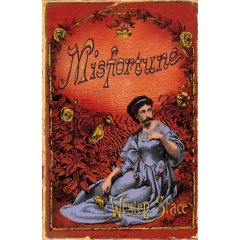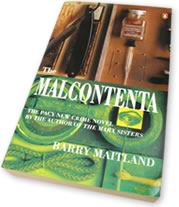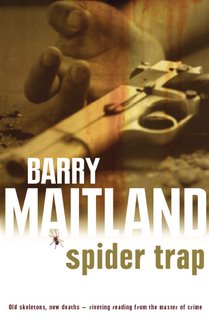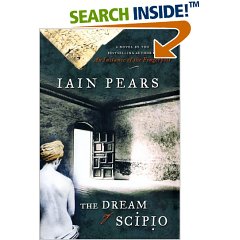Sorry, there was a point to that last post

Anyway, the "noisy/quiet" distinction was sort of relevant last week when I was reading Misfortune by Wesley Stace (confusingly, the nom de plume but REAL name of a comparatively well-known musician John Wesley Harding* which is in fact his stage name (nom de scene??))
This is an excellent book. I bought it because I fell in love with the cover but I don't understand how I missed hearing about it in because it got very positive reviews in the US at least.
It is a "noisy" book with lots of quirky characters who talk funny like in a Dickens novel and with the aristocracy behaving atrociously in a way reminiscent of Thackeray. As commonly happens in books by both of these guys, the plot relies on a large number of coincidences to resolve itself.
As a pastiche, it's really good but it does far more than that. Stace plays games with the expectations of the form to shift back and forth from omniscient to first person narration (and talks about this too). One of the characters is a balladeer and there's a lot about song writing. One chapter has someone in a fever speaking only in traditional songs. Another character is obsessed by a very peculiar poet.
It's the story of a foundling raised by an eccentric lord who decides, despite all physical evidence, that he has adopted a daughter. Because he's the richest man in England and quite peculiar, the servants, his wife and eventually the child collude to keep the illusion alive because the truth would too much for him to bear. This causes much confusion and consternation eventually.
Themes of hermaphroditism, cross dressing, and sexual awakening are handled really imaginatively. Stace talks a lot about Ovid's Metamorphoses which retell the Greek myths of changes (girls turning into trees, boys into flowers, gods into swans). There are also implicit parallels to Virninia Woolf's Orlando such as living the life of Reilly in an old English country house, a change of gender identity and a journey to Turkey where odd things happen.
It's also really funny in places.
Stace has also written something about Laurence Sterne I've resolved to track down. And another book is coming soon, hurrah!
*By which I mean that, while I hadn't actually heard of him or his music, when I got to the last page of the book and read out loud that John Wesley Harding had released 14 albums, my Beloved said "oh yeah, he's a really good folksinger" and that's saying something because B hates most folk music.
















